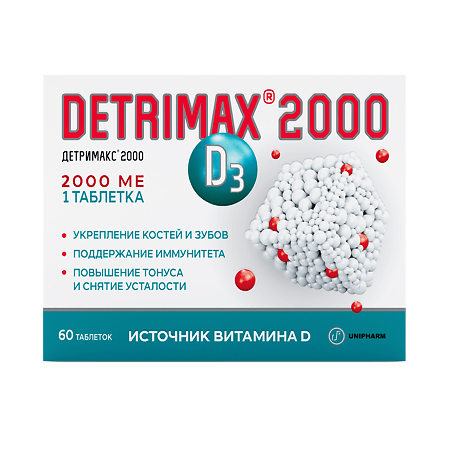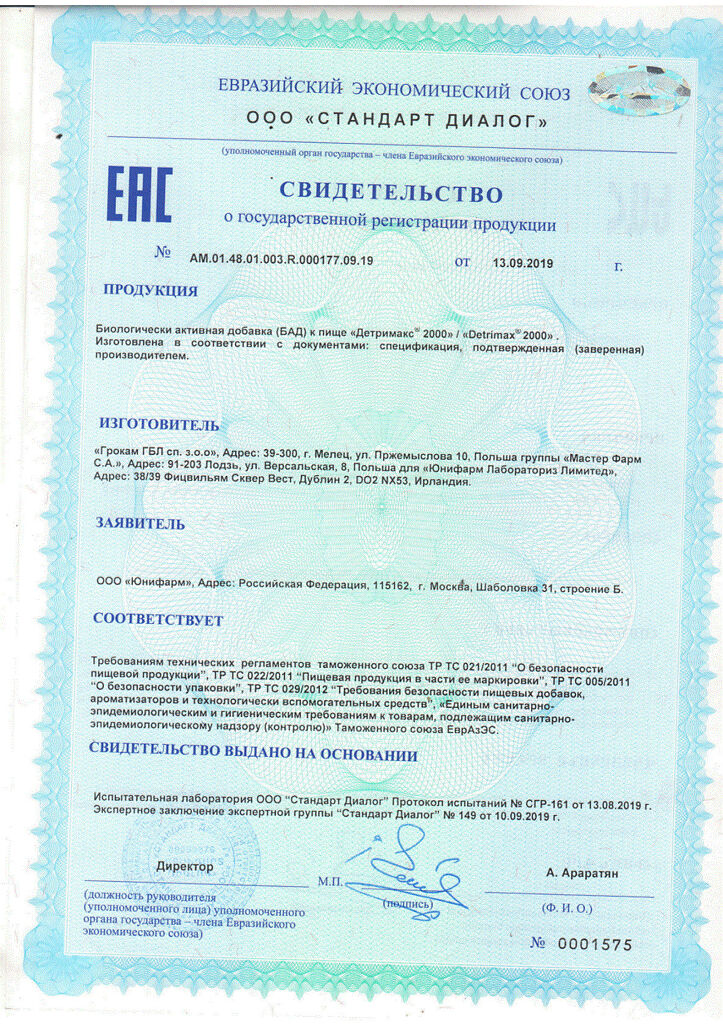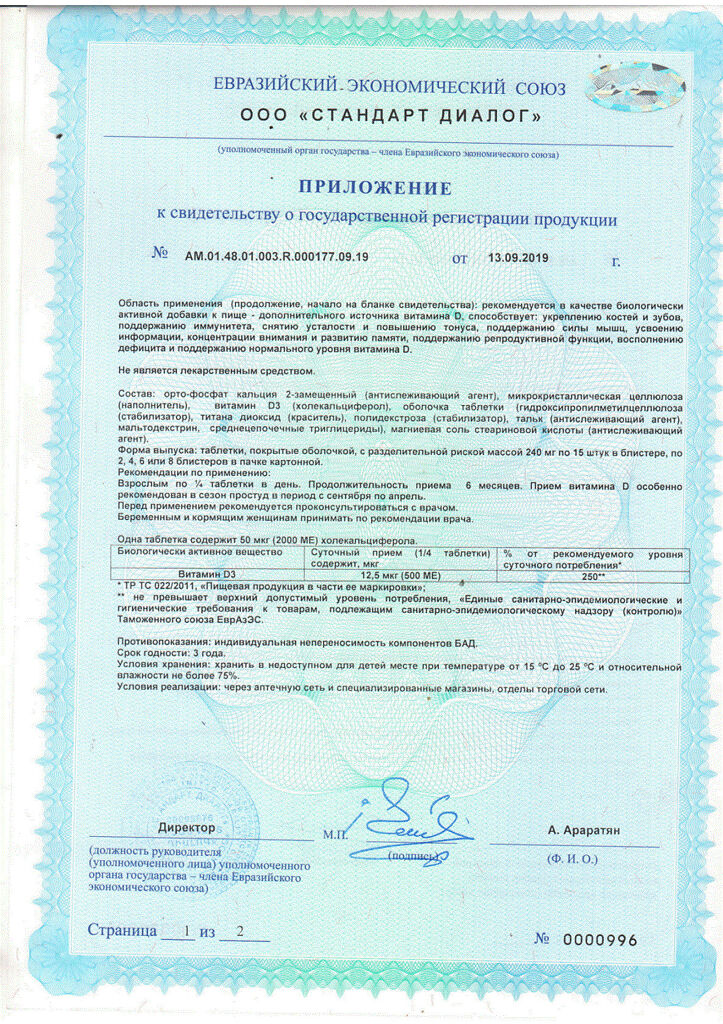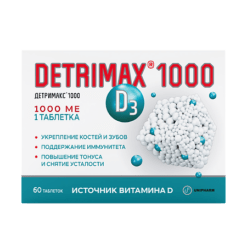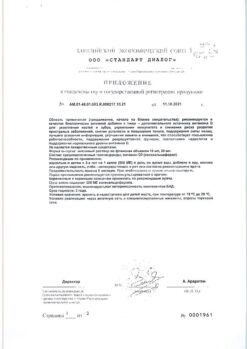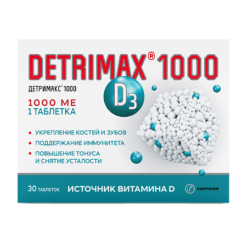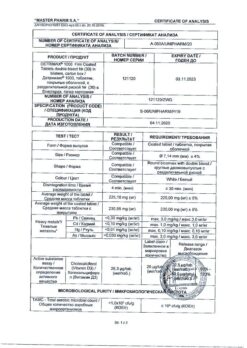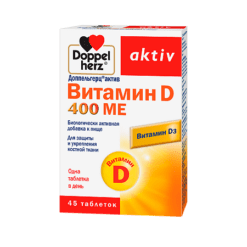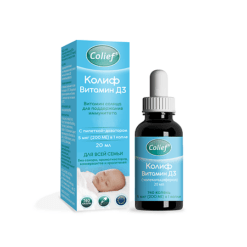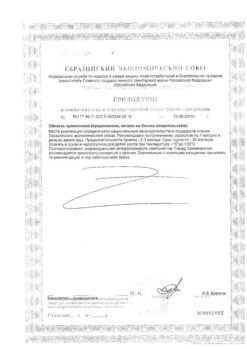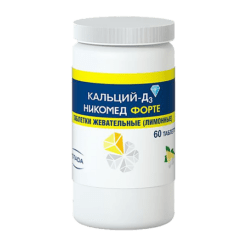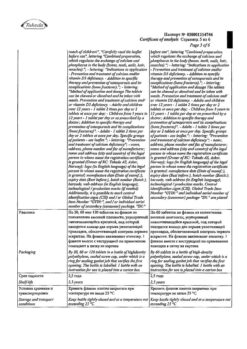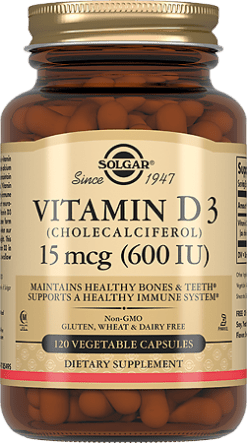No products in the cart.
Detrimax tablets 2000 IU, 60 pcs.
€14.15 €11.79
Description
Detrimax® 2000 contains vitamin D3 (colecalciferol), a vital fat-soluble vitamin necessary for virtually all human organs and systems.
The role of vitamin D in the activity of organs and systems
The musculoskeletal system. Participates in the regulation of phosphorus-calcium metabolism: helps the absorption of calcium in the intestine, maintains the necessary levels of calcium and phosphorus in the blood, activates bone metabolism. Helps ensure bone strength and reduce the risk of rickets and osteomalacia.
Containing normal levels of vitamin D is essential at any age, but especially in the elderly, when the risk of falls and bone fractures increases. Vitamin D strengthens teeth by activating the production of dentin, the main component of dental hard tissue. Adequate levels of vitamin D in the body reduces the risk of tooth decay.
It helps maintain muscle strength and neuromuscular conduction. Vitamin D deficiency is associated with muscle weakness, which may result in difficulty walking, especially in the elderly.
The endocrine system. Vitamin D is involved in the regulation of the function of almost all endocrine glands. It stimulates the synthesis of female and male sex hormones: estrogen, progesterone, testosterone. Helps maintain normal function of the thyroid and parathyroid glands, adrenal cortex, as well as the β-cells of the pancreas secreting insulin.
Reproductive function. Vitamin D has a positive effect on reproductive function in both women and men, including couples planning a pregnancy or having difficulty conceiving.
Women with sufficient levels of vitamin D are more likely to fertilize eggs. Lack of vitamin D deficiency improves IVF results. Vitamin D can have a positive effect on the endometrium by preventing proliferative processes, improving ovarian folliculogenesis and promoting egg maturation.
Carbohydrate and fat metabolism. Vitamin D promotes carbohydrate and fat metabolism, has a positive effect on glucose and insulin metabolism, and vitamin D deficiency is a risk factor for the development of insulin resistance and impaired glucose tolerance.
Vitamin D may stimulate insulin secretion by pancreatic β-cells and also indirectly activates calcium-dependent β-cell endopeptidase, which converts proinsulin to active insulin. Vitamin D can influence tissue sensitivity to insulin by stimulating the expression of insulin receptors in cells.
Vitamin D may help reduce blood levels of total cholesterol, triglycerides and low-density lipids. Due to these properties, vitamin D plays an essential role in the correction of obesity and metabolic disorders. It inhibits the process of lipid peroxidation.
The cardiovascular system. Vitamin D plays an important role in maintaining the function of the cardiovascular system: it has a positive effect on the inner layer and the muscular wall of blood vessels, as well as on blood clotting processes.
It has a positive effect on the activity of the renin-angiotensin system, which is involved in the regulation of BP, contributing to the normalization of arterial vascular tone and preventing a rise in BP.
The immune system. Helps maintain healthy immune function by positively influencing both innate and acquired immunity. It promotes the synthesis in the cells of the skin, respiratory and gastrointestinal epithelium of their own antimicrobial substances: cathelicidin and defensin proteins that destroy viruses, bacteria and fungi, thus reducing the risk of colds.
Vitamin D regulates the synthesis of substances (anti-inflammatory mediators) by immune cells to suppress inflammatory reactions in the body and also suppresses autoimmune reactions, preventing the development of immune-inflammatory conditions.
The nervous system. Vitamin D is involved in the regulation of the nervous system, having a positive effect on cognitive functions: memory, attention, ability to absorb information, performance. Vitamin D plays an important role in mechanisms of protection of the brain from damage – neuroprotection.
The bronchopulmonary system. Vitamin D is an essential factor in maintaining normal lung function. It is involved in maintaining airway muscle function, immune cell regulation, and a healthy inflammatory response.
Vitamin D helps improve lung function and increases the body’s defense against a wide range of infections, including tuberculosis and acute respiratory infections.
The skin. Vitamin D promotes better metabolism in the skin, increasing its protective properties and triggering programs to restore skin cell function. Vitamin D is a protective factor against photoageing, which decreases the skin’s barrier function and collagen production and results in a loss of skin elasticity, dryness, flabbiness and inflammatory changes.
The digestive system. Vitamin D affects the homeostasis of the gastrointestinal mucosa, contributing to the protection and preservation of the integrity of the epithelial barrier and its healing ability. Through its effect on the function of immune cells, vitamin D helps to suppress autoimmune inflammatory processes in the intestine. Vitamin D has a positive effect on the function of the gastrointestinal tract.
The regulation of energy metabolism. Vitamin D helps to reduce fatigue and increase energy levels in the body by regulating the energy potential of cells. The effect of vitamin D in the mitochondria of cells increases the production of ATP (adenosine triphosphate), which is its own universal source of energy for all biochemical processes occurring in the body.
The regulation of cell growth. Vitamin D has a regulatory effect on cell growth, development and renewal.
Epidemiological studies conducted in Russia have found that reduced concentrations of vitamin D in the blood are observed in 50-92% of adults of working age and children regardless of the season of the year.
The reasons for vitamin D deficiency in the greater part of the Russian population are both insufficient intake in food and a low level of its synthesis in the skin due to the geographical location of the Russian Federation (low insolation).
Health disorders associated with vitamin D deficiency:
- the main manifestation of vitamin D deficiency in childhood is rickets, in adults osteomalacia;
- in the elderly, vitamin D deficiency is primarily associated with muscle weakness, poor physical function and imbalance, increased bone fragility.
The Commission on Dietary Products, Nutrition and Allergies of the European Food Safety Authority has established a link between vitamin D intake with food and its contribution to normal immune system function.
Vitamin D3 (colecalciferol) when taken orally is almost completely absorbed (up to 80%) in the distal small intestine through the formation of micellar compounds in the small intestine environment. Cmax in tissues is reached after 4-5 hours, after which the concentration decreases slightly, remaining constant for a long time.
Additional information
| Manufacturer | Grokam GBL sp.z.o.o., Poland |
|---|---|
| Medication form | pills |
| Brand | Grokam GBL sp.z.o.o. |
Other forms…
Related products
Buy Detrimax tablets 2000 IU, 60 pcs. with delivery to USA, UK, Europe and over 120 other countries.

